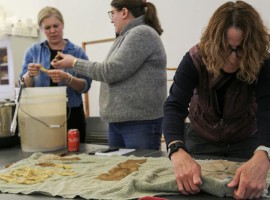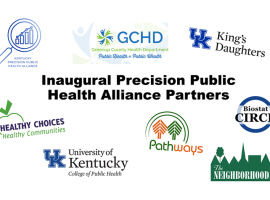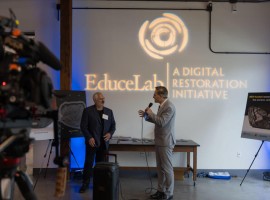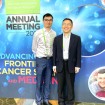A Lung Cancer Discovery 15 Years in the Making
Fifteen years ago Douglas Andres, and his team in the molecular & cellular biochemistry department in the UK College of Medicine, produced data that showed mutations in an on-off switch called RIT1 are a novel driver for human lung cancer.
He tried to get funding to delve deeper, but he was turned down. The grant reviewers came back with a very rational objection: “They said, ‘We know that cancer is a genetic disease, and we really like the data you developed, but you’ve got to show us that mutations actually occur in human cancer within this gene.’ And, at the time, that was an incredibly difficult thing to do,” Andres explains.
Fast forward to last year, his data was confirmed with gene sequencing—by a team at the Broad Institute of MIT and Harvard. Andres has a new two-year grant from the Kentucky Lung Cancer Research Fund to investigate RIT1.
The RIT1 protein is not only mutated in lung cancer, but also in a human developmental disease called Noonan's Syndrome, named for renowned UK pediatric cardiologist Jacqueline Noonan.
In this podcast, Andres talks about why he never gave up on RIT1 and what protein mutations like RIT1 mean for personalized medicine.
A Lung Cancer Discovery 15 Years in the Making - Podcast Transcript
Have you ever wondered who was doing the research that will impact your future? The research podcast lets you met those people, and learn how the University of Kentucky is exploring and strengthening our understanding of the world through research and discovery.
Here's Alicia Gregory, director of Research Communications.
Alicia: Today I am talking with Doug Andres, chair of the Molecular and Cellular Biochemistry department in the UK College of Medicine. Fifteen years ago, Doug’s team produced data that showed mutations in a protein called RIT1 are a novel driver for human lung cancer. His data was just confirmed with gene sequencing, and he has a new two-year grant from the Kentucky Lung Cancer Research Fund.
Douglas Andres: So, we study a family of proteins, called small G proteins, and you can think of them as on-off switches. And so, they control everything from how cells differentiate to how they grown. And in a disease like cancer, what happens many times, is that these switches get broken, and they get broken on the “on” position. And so they, the cells that have mutations, constantly grow even though they don't have the right signals coming from the environment. Actually the first project I worked on, as a new assistant professor, was to define and first identify this RIT1 protein. And, with my graduate students, we were able to show that RIT1 had the ability to control cell growth, and we showed that when the switch was broken, it actually could cause cancer-like growth properties.
And so, I was very excited, and set out to try to get funding for the work. And, it failed. And, the reason it failed was because the reviewers of that grant came back with a very rational question. They said, “We know that cancer's a genetic disease, and we... we really like the data you developed. But, you've got to show us that mutations actually occur in human cancer within this gene.” And, at the time, that was an incredibly difficult thing to do. We've never stopped working on RIT1, but we simply couldn't get funding to continue the work looking at its role in cancer.
Douglas Andres: I never really give up on anything. That's one of my talents, or craziness depending on how you view me. But, we didn't give up. And it just so happened that a little over a year ago, I got a call out of the blue, from a group that's at the Broad Institute at MIT and Harvard. And Dr. Meyerson there has a very large program in which he’s doing genome sequencing of a variety of different cancers. And so, he informed me that one of his postdocs and he had found mutations within RIT1 in a project they had been doing for many years, looking at lung adenocarcinoma. And so, we then collaborated to really repeat many of the studies that I had done with my students back in the late ’90s to demonstrate that these new mutations that they had found from human cancers had the same properties that we had been able to generate within the laboratory.
And, so that provided evidence, exciting evidence, that indeed RIT was mutated and that it's a driver. So, initial mutations in this switch that breaks it, are one of the first mutations that happens in a cell on its way from being a normal cell within the lung to a lung cancer. And so the grant that we got is to push that work forward, and we hope will lead to greater understanding of that mutation and how those tumors may differ from tumors that have been seen before.
Alicia: So, you've know about RIT1 for a long time.
Douglas Andres: We've never stopped looking at the role of this protein, but we've largely studied in the context of the neuron and how the same signaling pathway affects neuronal growth and differentiation. It's one of the fascinating things about signal transduction that the cells in your body have only a finite number of pathways for transmitting information. And so they are really creative in reusing the tools that they have to shuttle new information in. So, the proteins that we find, these switches in one cell may control one aspect of biology and a different cell in the same body, but just a different cell type, it may have a different role to play. And, that's really one of the things that’s fascinating about it.
Alicia: What have been some of the most fulfilling moments for you, related to your discoveries?
Douglas Andres: Each time that we really gain fundamental insight into a problem; that is an exhilaration. Sometimes those things happen in six months of work, or in a year of work, or I think this is a great example, it's taken 15 years between when we made an initial discovery and when it was actually found that our initial hypothesis was correct, and that the ideas that we’d had 15 years ago actually come to fruition. So that was really quite special.
The other thing that's really interesting about the RIT1 protein, is it not only is found to be mutated in lung cancers, but also in a human developmental disease called Noonan's Syndrome. You might not know, but Noonan's Syndrome is named for cardiologist Jacqueline Noonan, who actually is a faculty member at the University of Kentucky. So, I had the pleasure of meeting Dr. Noonan and talking about RIT1 mutations with her just in passing at a gathering, and that was really pretty special. The scientific world is so small that you could actually meet someone who started a field, and that you contribute to. That was pretty neat and pretty special.
Alicia: What are you most excited about, in terms of the impact of your research, in the near future?
Douglas Andres: The data that we have suggests that RIT1 mutations are most closely associated with cigarette smoking. So tobacco use as, I think everyone knows, is really the primary driver of the mutations that underlie lung cancer. If people would stop smoking, then lung cancer as a worldwide health crisis, would largely be ended. So, it's the number one killer worldwide from cancer.
I think that RIT1 mutations are likely to be more prevalent, unfortunately, in patients in the state of Kentucky than in many other parts of the country, because of the very high smoking rates that are still found within the state. So my hope is first, that by identifying these mutations with my collaborators at the Broad Institute that we'll be able to develop diagnostic tests, so that patients that come in with lung adenocarcinoma may be diagnosed as having a RIT1 dependent sub-type. And, with that understanding, perhaps clinicians can develop better treatment strategies for those people in the near term. And interestingly, because of the connection to Noonan’s Syndrome, the same thing may be true for patients with Noonan’s Syndrome.
Longer term, I hope that the research that we will do, that's funded by the Kentucky Lung Cancer Research Grant that I just got, will help to give us additional insight into what makes RIT-dependent lung cancer different than some of the other driver mutations that develop similar types of disease, but they are clearly different, because they're genetic underpinnings are different. And, and if that work would go forward, I hope a little longer term, that we would be able to help in developing new therapies for those patients.
Alicia: So, this particular protein would be a large step forward in terms of the personalized medicine that everybody is talking about?
Douglas Andres: That's right. In fact the best therapies now involve insight into how particular classes of lung cancer develop, particularly a sub-class that involves a receptor. And there have been drugs that have been developed to specifically interfere with the actions of that receptor. And those have proven to be highly, highly effective in treating patients. But, unfortunately, that's still just a fraction of all the patients that develop these tumors, and so, that’s right. The idea would be first that the insight we've gained would provide the idea that you could personalize the type of tumor down to the driver that leads to its generation. And then secondly, the hope is by having that information, you would be better able to develop therapies that would target that particular sub-type of lung cancer.
Alicia: So, in looking through the list of your currently funded projects, you're touching on a lot of different areas…
Douglas Andres: We are.
Alicia: … from brain injury to heart failure to lung cancer.
Douglas Andres: Uh-huh.
Alicia: So, the common denominators in all this?
Douglas Andres: So, I'm a biochemist and so my philosophy is a reductionist. So, the way I approach science, is to try to reduce it to a single molecule. Understand that molecule really well. Then, through that understanding, hopefully then expand back out to look at disease processes or... or bigger questions. And so, although I have funding from many sources, in the end, what I'm interested in is how cells communicate and how when that communication breaks down, if affects the whole organism. Whether that's an organ like the heart, or generating tumors, they all come down to that same fundamental question. And then, once we understand that, it turns out that in many cases the defects that we see may be involved in disease processes in a multitude of different cell types. So we study a couple of these different switches, and that also leads to that diversity, but largely in the end, we're interested... the thing that drives me is this... is the same: how to understand, fundamentally, how these on-off switches operate, and then to understand when they're broken, how that affects human health.
Alicia: So, how did you first get interested in this cell signaling?
Douglas Andres: So, so I think I've always... always been fascinated by biology. So, as a young child, I was someone who would go out and do things like catch snakes and then bring them home and hide them in my bedroom. Against my mom's wishes. And I never really lost that. Through school, it was always something that was really interesting to me. When I got to college, I had a family member who got cancer. That experience really probably changed the course of my life. And, so, I decided that that was a disease and a process that I wanted to better understand. And really, fundamentally, much of disease involves miscommunication. And so that's signal transduction. And, I always then knew I would either be a physician or a scientist. I really love the freedom that a laboratory provides, and so I can follow sort of my bliss. And, so far, I've been able to convince people to help support my research, and so I've been fortunate to be able to understand and touch on a lot of different disease processes.
Alicia: What is the most challenging aspect of the work that you do?
Douglas Andres: I think the most challenging part of doing modern biomedical research, is simply the pace at which new information is being gained. So, the differences between when I started graduate school to now are truly mind boggling. There are things that are done now in my lab that I never thought would be possible, let alone something that I would be involved in and doing. There's that challenge of internalizing all that new information, and then deciding how your work fits into this dynamic every changing environment. And trying to work to contribute in a significant way to that new knowledge. And so, that's really a challenge, but is also part of the thing that really drives you and is a lot of fun.
Alicia: What is your favorite part of being a researcher?
Douglas Andres: It's the thrill of exploration. There's excitement in the chase. There's lots of hard work that's involved, and that's almost always done as part of a team. So, there's an added sweetness when you make a discovery and you can share that with people that, in many cases, you've been toiling, you know, at the... at the bench for many, many hours, for many, many years. And, that... that, you know, makes it even more special.
Alicia: What inspires you about the University of Kentucky?
Douglas Andres: I think it's the people. So the university is really unique in that we have quite accomplished group of researchers. And so, I think that the university researchers in general, punch way above our weight, and the reason for that is because of the collaborative nature of the group. So, I've never been turned away. I've shown up at people's door, asking for help in understanding a process, or help in developing an assay, and people have been unfailingly kind and generous with their time and reagents, and ideas. And, so that really has been one of the things that has kept me here for so long. The people are really quite special. And this kind of environment is not one that I've encountered in any of the other places where I've performed research.
Alicia: What would you tell someone who's thinking about joining the research enterprise at UK?
Douglas Andres: It's one of the few universities that has an academic medical center located on the campus. So, you have everything from the Ag school to a medical school, to a large undergraduate campus all within walking distance. So, almost independent of what, you know, what idea strikes you, what information you want; whether you want to name a gene and you need a Latin scholar, or you... I have colleagues who study processes that actually end up being important in plants, and so they have collaborators working on plants. And, you wouldn't think that would be possible if you were working in a college of medicine, but on UK that's really true. And, and again, because those people are so kind with their time and helpful, it's possible to have collaborations that span the breath of the faculty that are here, and that makes the place pretty special.
Thank you for listening to the Research Podcast. To subscribe to our podcasts on Soundcloud or iTunes, search University of Kentucky research media and visit our site; reveal.uky.edu





